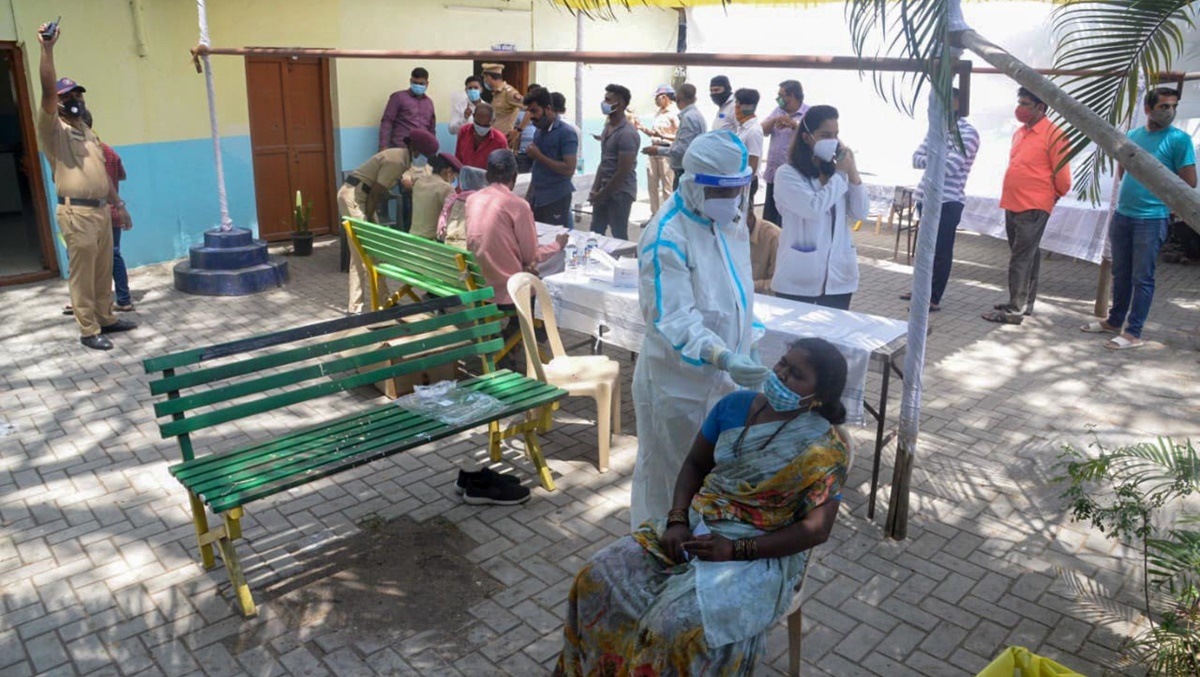 Covid Testing being carried out by the PCMC police. (Express file photo by Rajesh Stephen)
Covid Testing being carried out by the PCMC police. (Express file photo by Rajesh Stephen) Of the 1,727 Covid-19 deaths that occured in April and May in Pimpri-Chinchwad, 30 per cent cases had no previous ailment or co-morbidity. They died only due to Covid-19.
“It had been said by experts in the first wave that Covid-19 poses serious threat to those with co-morbid conditions. But in the second wave, those without any co-morbidity also died in large numbers, many of them youngsters,” said Municipal Commissioner Rajesh Patil on Wednesday, while appealing to people to get themselves tested as soon as symptoms appear.
“Nearly 66 per cent of those who died had hypertension and 44 per cent had diabetes,” he added.
Compared to the first phase, the virus had spread fast in the second wave, he said. “And in short duration of time, we saw the condition of patients turn serious. It took time to understand the nature of this virus. People also remained careless. They did not follow guidelines. Many took time to get themselves tested. They were overconfident and several preferred to treat themselves at home,” said Patil.
Of the 1,727 Covid-19 deaths in April and May, the health department has analysed 1,500, Patil said. “Of these, 21 per cent deaths were of those above 45 years of age, 32 per cent were between 46 and 60 years of age and 47 per cent of the deceased were above 60 years of age,” he said.
He added, “Of those deceased above 45 years of age, 14 per cent had no co-morbidities. In the 46-60 age group, 15 per cent had no co-morbidity while in the 15-30 age group, two per cent who died had no other ailment.”
Nearly 33 per cent of the patients whose oxygen level dipped to 80 per cent died, said Patil. “At this stage, different organs in the body are damaged. If blood oxygen saturation is going down, patients should never waste time in getting admitted. However, many did not seek treatment on time, which resulted in fatalities,” he added.
Pointing out that several patients who died had dropping oxygen saturation level, Patil said, “At least 70 per cent of those who died had blood oxygen level below 90 per cent. They reached hospital only when their oxygen level was dipping.”
Patil said, “Nearly 12 per cent of those who died had oxygen level below 60 per cent. Twenty one per cent of those who died had oxygen level between 60 and 80 per cent and 37 per cent of those who died had oxygen level between 80 and 90 per cent. Oxygen level dipping below 90 per cent is a dangerous sign.”
“It has been observed that patients after developing symptoms refused to get tested and treated. Many chose to remain home isolated. Only when their condition started deteriorating were they rushed to the hospital. Not just the patients, even their families did not take the initiative in getting the patients tested and treated as soon they developed symptoms. When the oxygen level had started going below 90, the patient needed ventilator help. And once the patient goes on ventilators, it becomes to difficult to save his or her life. Only 25 per cent of those who required ventilator support recovered,” said Patil.
Dr Rajendra Wable, dean, YCM Hospital, said, “Many patients, after developing symptoms, went to one general practioner after another, which led to delay in getting proper treatment. For instance, when a patient goes to a general practitioner with upper respiratory symptoms, the doctor will give him symptomatic treatment for two-three days and then starts antibiotics treatment. If the patient still doesn’t feel good, he then goes to another general practioner, who might again start symptomatic treatment or ask him to get tested. This delay in getting tested for Covid and starting prompt treatment has proved fatal, even to those who were not co-morbid. It should be remembered that day five to 10 are very important in case of Covid symptoms. If the infection is not controlled, conflagaration starts in the body and the disease becomes severe.”
- The Indian Express website has been rated GREEN for its credibility and trustworthiness by Newsguard, a global service that rates news sources for their journalistic standards.

